Preventing Disability among Labor Migrants Returning to Tajikistan
Read also

DUSHANBE, 18.10.2023 (NIAT Khovar) – There are various causes of disability among labor migrants. Often, it is related to difficult and dangerous working conditions, insufficient medical care and social protection, as well as discrimination and neglect on the part of employers. According to the Russian Federal State Statistics Service, the number of accidents related to falls from heights in Russia is significantly higher than in most other countries. This is one of the common causes of death and disability in Russia. Most of the victims are people working on construction sites. On average, about 10 thousand accidents related to falls from heights occur in the country every year.[1]
Umarjon Gadoev, a disabled person of the first category, a resident of Abdurakhmoni Jami district. Six years ago, being absolutely healthy, he went to Russia to earn money and, like many people, got a job at a construction site. “I worked hard, with due diligence, but one day I had an accident – because safety measures were not observed, I fell from a height and got seriously injured. I was working at a company and did not have health insurance. Therefore, my employer provided me with only minimal, symbolic assistance. I was very lucky that our compatriots, also migrant workers, helped me at that time. They raised money for my surgery and treatment. Two months later, I returned to my homeland. Today, based on my sad experience, I ask those who go to work – to prepare the necessary package of documents, especially the health insurance.
The International Organization for Migration together with the Tajik Ministry of Health and Social Protection of RT and the Ministry of Labor, Migration and Employment of RT with the support of the IOM Development Fund conducted research «Disability among returning migrant workers in Tajikistan: a multimethod research study”. The aim of this work was to study the causes of disability and prevalence among returning migrants and to identify needs and problems in this category of citizens, in particular with regard to access to social and medical services. The study revealed that many returning migrant workers were healthy before leaving, but their health was compromised (to the point of developing disabilities) while working in the country of destination.
The main risk factors for disability among migrant workers from Tajikistan were identified: non-compliance with occupational health and safety standards in the workplace; work without a formal employment contract and social benefits, including health insurance and access to medical care; poor housing conditions and exposure to harsh climate and, of course, employment in industries with heavy manual labor and harmful conditions (construction, etc.).
According to IOM International Consultant, Doctor of Economics, Professor Sergey V. Ryazantsev, he often met young and adult people who had worked for several years in Moscow and other regions of Russia, and, unfortunately, lost their health, many of them became disabled.
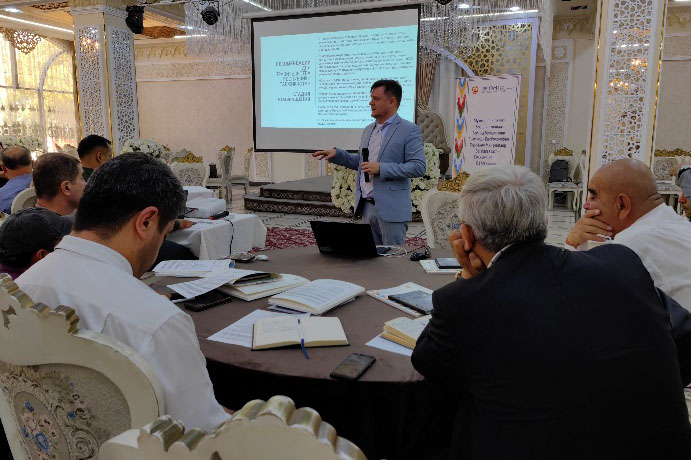
Studying the problem of disability among migrants is very important – first of all, from a humanitarian point of view, as the health and life of each person is the most important human capital. “Secondly, this problem is relevant from a political point of view – because Tajikistan cannot solve it alone. The problem should be considered in cooperation with the country that receives migrants and uses migrant labor. However, the use of labor is also the responsibility of the state, in this case the Russian Federation and other countries of destination. I am sure that our research report will further influence migration policy, including the policy of the Russian Federation. Within the framework of the project, IOM managed to conduct a quantitative study by including migration issues in the national disability survey, which was conducted by the Tajik Ministry of Health and Social Protection together with the Japan International Development Agency (JICA). In accordance with the Washington Protocol, respondents with functional limitations such as hearing or visual impairment, mental status, etc. were interviewed. This was an important category – as many of them worked overseas and lost their health”.
“The undocumented status of many migrants from Tajikistan leads to frequent violations of labor rights by employers and a lack of social protection” – the IOM study notes. Almost all respondents who took part in the study were exposed to hazardous factors, as most migrant workers from Tajikistan work in low-paid jobs: men – in construction (45%) and in the service sector (22%), women – in cleaning (27%) and maintenance (18%). 17% of respondents reported exposure to two or more harmful factors. The most common were exposure to chemicals and humidity (for women), and dust, heavy lifting and noise (for men).
Despite dangerous working conditions, the majority of labor migrants did not take any action to change the situation (49% of women and 56% of men). Among the surveyed migrant workers with functional limitations, 40% of women and 56% of men did not sign labor contracts. Only 33% of women and 37% of men tried to negotiate with the employer to improve working conditions; 11% and 12%, respectively, tried to find another job. According to the findings of the study, informal employment of the majority of labor migrants who do not sign labor contracts with employers leads to disregard for occupational safety and health standards, and to the lack of social protection, medical care, compensation for injuries and disability pensions.
Most labor migrants emphasize that poor living conditions are their conscious choice – due to the desire to save as much money as possible and remit it to their families. At the same time, they try to save money on everything, including health insurance: only 52% of male and 47% of female respondents had health insurance. The situation is aggravated by labor migrants’ disregard for their health: only 19% of labor migrants with functional limitations who returned to Tajikistan used medical services in Russia.
Upon returning home, migrants with disabilities try to actively maintain relationships with colleagues and friends, take on additional family responsibilities, and get back to work.
“Despite the fact that I have physical limitations, I am not discouraged. I realized that, as before, I have to take care of my family. I took tailoring courses, and currently, I work at home. I receive orders for men’s and women’s clothing. Thanks to this, I do not feel incapacitated”, — says Umarjon Gadoev, former labor migrant.
However, the study also revealed the existence of negative attitudes towards persons with physical disabilities in certain communities. This causes depression, sleep disorders and sometimes leads to suicidal thoughts among migrants with recently acquired disabilities. The situation is aggravated by high unemployment among returned labor migrants with physical disabilities. Especially women suffer from unemployment. The reasons are health conditions and difficulties in performing work related to physical or mental disabilities. Some respondents noted the lack of suitable jobs and low wages. This explains the intention of the majority of interviewed labor migrants with functional limitations to go to labor migration again, despite the existing health problems.
Therefore, a set of adaptation and reintegration measures, including social support, development of skills and knowledge for income-generating activities, and psychological assistance, is important for this category of labor migrants.
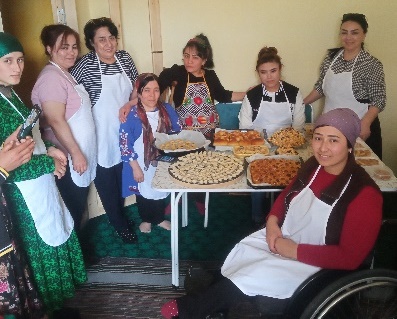
For example, almost every family in the Histervarz Jamoat of Bobojon Gafurov district purchases delicious pastries from the Mashkhur mini-cooking shop. The skilled artisans of the shop are local residents; some of them are women with disabilities; others are former migrant workers or members of their families. All of them have one thing in common – for a long time they needed psychological help and could not find employment. They have been “heard” by the International Organization for Migration, which together with the NGO “Chashmai Hayot” implements the project “Rights and Dignity” in Sughd region. The project is aimed at involving returned migrant workers in income-generating activities. Project participants note that now they do not feel like a burden to their relatives. When they see the results of their work on the tables of local residents – fragrant, tasty pastries – they realize that they benefit not only their families, but also the local community.
Thus, comprehensive measures are needed to address the problem of disability among Tajik migrants. These include pre-departure training of migrants on migration legislation in the host country, professional training and retraining, as well as training on safety measures, injury prevention, etc. It is also necessary to strengthen work with employers in host countries to ensure proper working conditions and migrants’ access to medical care. Solutions to reintegration problems at home, especially for migrants with disabilities, may include psychological assistance, social adaptation and the creation of friendly environment for income-generating activities, including small business. The solution is possible only if there is a multi-sectorial approach and interaction between government, public organizations and the international community.
Shoira Toirova
[1] https://play-side.ru/новости/статистика-падений-с-высоты-в-россии-а











 Starlink Satellite Internet Launches in Tajikistan
Starlink Satellite Internet Launches in Tajikistan Austrian Company Andritz Hydro Seeks to Expand Cooperation with Tajikistan
Austrian Company Andritz Hydro Seeks to Expand Cooperation with Tajikistan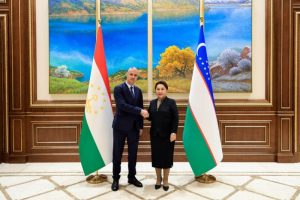 Ambassador of Tajikistan Meets with Chairperson of the Senate of Uzbekistan
Ambassador of Tajikistan Meets with Chairperson of the Senate of Uzbekistan Tajikistan and Japan Discuss Cooperation within Regional and International Organizations
Tajikistan and Japan Discuss Cooperation within Regional and International Organizations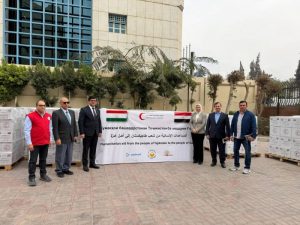 Tajikistan’s Humanitarian Aid to the People of Gaza
Tajikistan’s Humanitarian Aid to the People of Gaza Bilateral Cooperation Between Tajikistan and Azerbaijan Discussed in Dushanbe
Bilateral Cooperation Between Tajikistan and Azerbaijan Discussed in Dushanbe Tajikistan Establishes Data Protection Center to Strengthen Cybersecurity
Tajikistan Establishes Data Protection Center to Strengthen Cybersecurity Center for Strategic Studies of Tajikistan Expands International Cooperation Network
Center for Strategic Studies of Tajikistan Expands International Cooperation Network Coins Dating Back to the 1st Century AD Discovered in Tajikistan
Coins Dating Back to the 1st Century AD Discovered in Tajikistan Trade Turnover Between Tajikistan and Pakistan Reaches $43 Million in 2025
Trade Turnover Between Tajikistan and Pakistan Reaches $43 Million in 2025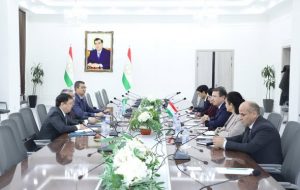 Days of Kazakh Medicine to Be Held in Tajikistan in 2026
Days of Kazakh Medicine to Be Held in Tajikistan in 2026 Tajikistan Highlights Investment Potential at B5+1 Forum in Bishkek
Tajikistan Highlights Investment Potential at B5+1 Forum in Bishkek














